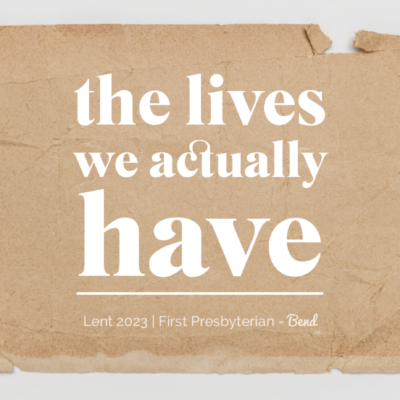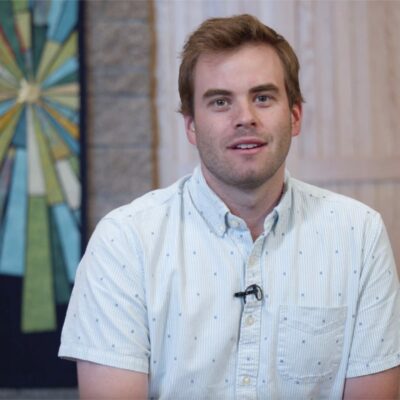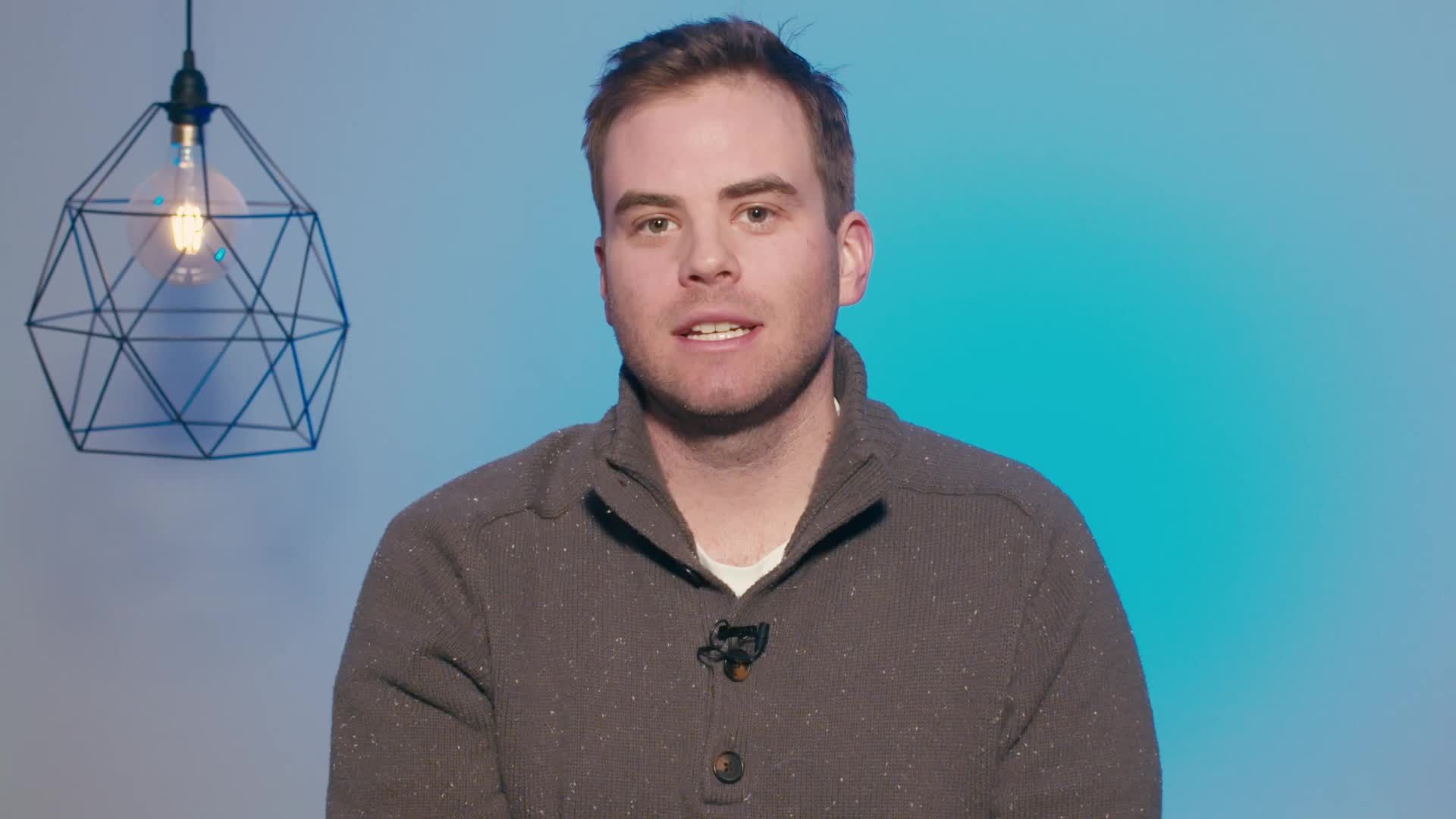Mar 19th, Blessed Are Those Who Feel Alone, with Rev. Tyler McQuilkin
A Part of the Series:
Rev. Tyler McQuilkin
Other Articles in:
Mar 19th: Blessed Are Those Who Feel Alone, with Rev. Tyler McQuilkin.
Our Scripture lesson today comes from Psalm 23, and it says, The Lord is my shepherd, I shall not want. The Lord makes me lie down in green pastures and leads me beside still waters and restores my soul. God leads me in right paths for God’s name’s sake. Even though I walk through the darkest valley, I fear no evil, for you are with me. Your rod and your staff, they comfort me. You prepare a table before me in the presence of my enemies. You anoint my head with oil, my cup overflows. Surely goodness and mercy shall follow me all the days of my life, and I shall dwell in the house of The Lord my whole life long.
I was sitting in a chapel service at Princeton Seminary, and the preacher said something that has stuck with me ever since. They said, in our world today, we tend to think that the past is gone and that the future is uncertain, and the present is all that is clear.
The Bible, however, believes the exact opposite. He continued saying, it is the past. And the future that are clear, and the present and our choices are what remain uncertain. Psalm 23 articulates this thought quite well. This psalm is attributed to King David, and many believe it was written while he was fleeing persecution from King Saul who wanted to kill him.
Now, it isn’t difficult to see the hope within the uncertainty as this psalm was written. David’s problems are not resolved in the present. He is still being pursued as he wrote this, but he hopes that things will get better. He says, Surely goodness and mercy will follow me, which points towards his future, which is clear, but it is not yet a reality for him.
As much as we want to take over our present situations and say we have everything under control, what we do now is truly uncertain and unclear. And yet we can continue to have trust and hope that God will be true to God’s promises for our future. Psalm 23 is one of the most well known passages in all of Scripture. It has been read and recited through the centuries by people in all sorts of situations. When we read the Psalms in the old Testament, we have to remember that these were first Jewish sacred texts long before Christianity even existed.
Pastor and theologian Craig Barnes says that when we read these texts, “It is wise to remember the Jewish history with God. In Genesis 32, Jacob wrestles with God and is given the new name of Israel, which means one who has wrestled, or struggled, with God.”
So when we remember the history of the Jewish people, we have to remember that they are a people constantly wrestling with God, struggling to understand their place in the world and how God is faithful to them.
Barnes writes the Hebrews struggled for a home that they were always trying to get into, hold on to or get back to. They struggled for peace, for feud, for food and for future. Most important, they struggled for their faith in God. Now, you don’t have to spend too much time in the Old Testament scriptures to see the ups and the downs, the highs and lows of the ancient Jewish people’s life, from spending 40 years wandering in the desert to conflict, tensions, wars and so much more once they reach the Promised Land.
From then, living in exile for decades or living under Roman occupation, it is clear that the Israelites had a difficult existence trying to survive the hardships life threw at them. And yet, even during these ups and downs, Psalm 23 has been used to bring them comfort in the midst of these trials.
And today, in our own hardships, Psalm 23 continues to bring comfort and hope to so many people. When the Pandemic started in March 2020, I was in my second semester at Princeton Seminary. Fortunately for my wife and I, we were able to make some great friends during the six months of normalcy before the major lockdowns went into effect. We are still so grateful we had that time to make friends, which allowed us to stay in touch virtually with zoom and later have socially distanced hangouts outside when the weather warmed up. My second year of seminary started the fall of 2020 when cases were still high and there wasn’t a vaccine to protect us.
Yet, like many schools, my seminary announced that we would be remote for the entire school year to best help prevent the spread of the virus, the school tried to welcome new students with a virtual orientation and zoom small groups with students. But as you can probably imagine, this was nothing compared to in person interactions that are so helpful in making new students feel good about their new home and place of study. So it isn’t a surprise that so many of the new students that year shared how lonely they were during their first year.
During the Pandemic, I took up running to break up my routine of being online all day, and one day in november, a friend and I went on a run together and as we were walking back on the trail back to the seminary housing, we walked by a couple about our age out on a walk together. We assumed that they were probably connected to the seminary in some way since they were on this secluded trail near the student housing, so we asked if they were students at the seminary.
Their names are Sawyer and Leah, and we ended up talking with them in the cold November night for about ten minutes and learned that they had to postpone their wedding due to COVID and just had a small ceremony with family before they quickly moved to New Jersey for Sawyer to study. At the end of the conversation, we exchanged numbers and said we would love to hang out again they became some of our closest friends from our time at Princeton.
And as our friendship developed over the two years, they eventually told me that we were the first people to say hello to them from our seminary apartments. When he told me that, I was shocked. Not so much that they hadn’t had any social interaction with anyone from the school, but that they were newly married, had just moved to a new state 2000 miles away, and they were already considering moving back home after that first semester because they were so lonely during those first few months. As I’m sure you know, this was the case for so many people during lockdown and continues to be the reality for so many people now. Researchers and sociologists have been saying that the COVID pandemic only accelerated things that were already trending in society. One way the pandemic has influenced society is the rise in loneliness that was already present for so many people. Even before the pandemic, people were saying that even with the rise of being connected to one another through technology and social media, we are actually the most disconnected society has ever been.
Rather than having close relationships where we are valued and loved, society was already moving in the direction of surface level relationships without deep connections. Sure, this might be a blanket statement for many of us. I’m sure many of us have close relationships where we can be our true selves without fear or shame or judgment. But for many people, this loneliness was already occurring in their lives. And the pandemic just accelerated this loneliness for larger numbers. Taking a society already moving toward disconnection and loneliness and having everyone stay home and distant from others, we were able to slow the spread of a deadly virus and prevent physical harm and death for so many people. But this also had tremendous effects on mental health and loneliness in the world. According to us. Surgeon General, we are suffering a pandemic of loneliness. At least 60% of Americans report feeling alone, and that number rises to 75%.
When talking about young people. With this rise in loneliness in society, we have to ask where is God in our loneliness? What might God have to say to us as we suffer from this new pandemic of loneliness?
Like the Israelites who held Psalm 23 close to their hearts in the midst of their own struggles and hardships, maybe we can also hold Psalm 23 close to our hearts and see that God remains close to us even as we walk through our own dark valleys.
Psalm 23 is written almost like a journal entry or a prayer written during this time of pursuit and persecution. David starts this psalm by referring to God in the third person for three verses. It says things like the Lord is a shepherd, and then continues referring to God in the third person, saying that God makes him lie down in green pastures, leads him beside still waters and restores his soul. Then, after all this talk in the third person, David changes to the second person.
When referring to God, he writes even though I walk through the darkest valley, I fear no evil, for you are with me.
Your rod and your staff, they comfort me. The shift from the third person language to the second person language isn’t just a change in language itself, but it is also a shift in how David.
Understands his relationship to God.
This shift to the second person is.
As if David is finally recognizing God’s presence as he walks through the darkest valley. God is with him in this moment.
God is comforting him in this valley. In the world today, it can often be difficult to see and believe that God is present and working in our midst. It is difficult to see God’s Spirit at work when we see all the terrible things happening in the world. Some might call these difficult things their.
Own dark valleys they walk through.
Whether it is war, wildfires, floods or oppression affecting people in the world, or maybe it’s conflict within our friends or family mental health, making each day a struggle, or living in this pandemic of loneliness, it can be difficult to see God in our midst when we are in the darkness. But this psalm does not shy away.
From the dark valleys of life.
David fully acknowledges walking through the dark valleys instead. Verse four begins with the simple phrase.
Even though even though I walk through the darkest valley, you are with me. So when we look at our own dark valleys, our own loneliness, we need to remember that even though we all will have to walk through dark valleys.
God is with us in our darkness.
Even though our world continues to wage war for the sake of war, even though communities are regularly devastated by wildfires.
And floods, and even though our relationships.
With others and ourselves are not as healthy as they could be, god is.
With us in all these dark valleys. This psalm doesn’t say anything about the Christian life getting easier.
All it says is that God is with us, even though we walk through dark valleys. A few weeks ago, our youth group.
Went up to Settle Lake for a retreat, and Psalm 23 was the theme for that weekend. We looked at this passage in a number of ways, discussed the psalm’s meaning in small groups, and asked what this psalm might mean for us today. One activity we did during the retreat was an art project, asking students to depict this psalm through art. One student decided to focus on the valley, the dark valley. He found a stack of black paper.
And cut outlines of hills so that the ground was all black.
Then he found a dark purple piece of paper and used that for the sky, making it look like the sun.
Had just gone down and night was taking over.
On the middle of the page, he had the silhouette of just one person.
Walking through this darkness alone.
But on this person’s chest, right above their heart, there was the smallest light.
There shining with them as they walked in the dark valley.
When he explained his artwork to the rest of the group, he said that the light on the person’s heart represents God’s presence with him, and it is small, but still has the possibility to.
Grow bigger and brighter despite the darkness. Although valleys in life can seem dark.
Especially these valleys of loneliness that so.
Many people in our communities are experiencing.
Right now, know that God is the.
Good shepherd that watches over all of.
Us, all of us sheep. The psalm doesn’t say anything about the dark valleys disappearing in life.
Instead, even though we will walk through the valleys of darkness in life, god.
Is in our midst, maybe as just a small light for us. But as we continue to put our hope in God, maybe that small light.
Can continue to grow brighter.
Because even though the present remains uncertain and darkness and loneliness seem to be.
Taking over, the future has already been written down. When David writes at the end of.
Psalm 23 I will dwell in the.
House of the Lord forever.
So even though our dark valleys of loneliness might not have a quick remedy.
Know that God is with you, God is for you, God is ahead of you. And as our good shepherd, God will not abandon us. Amen.



